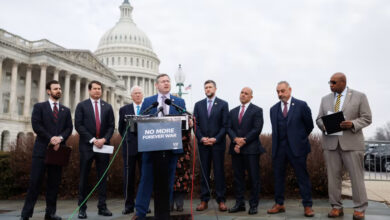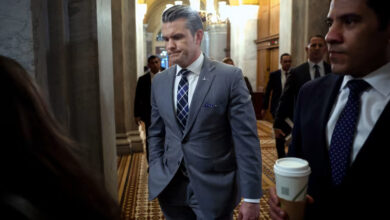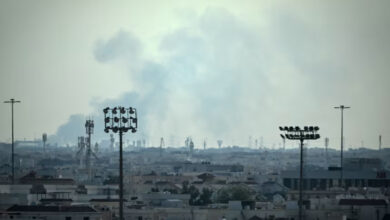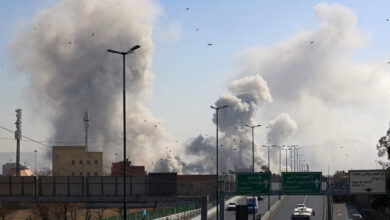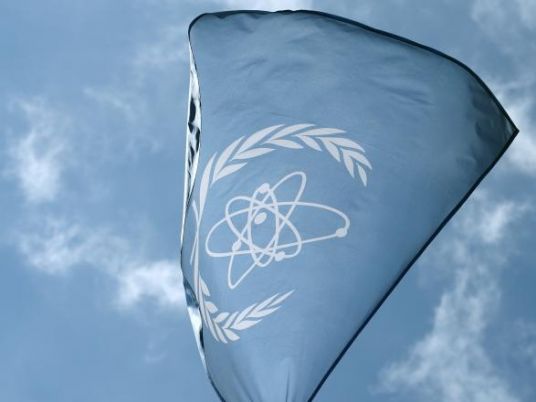
A standoff between the European signatories to the Iran nuclear deal and Tehran has been eased, at least temporarily, by the Iranian regime’s agreement to hold technical talks next month with the International Atomic Energy Agency (IAEA) over questions about its nuclear program.
“We are encouraged,” IAEA Director General Rafael Grossi scheduled a news conference Thursday. “Iran has finally welcomed and accepted my initiative to engage in a focused and systematic effort aimed at attempting to clarify a number of outstanding issues…[such as] the presence of uranium particles and also doubts about certain materials that exist in Iran, which were not declared before and that we have been discussing about for quite a long time.”
IAEA inspectors last month found uranium particles at two previously undeclared sites that Iran had long prevented them from entering.
IAEA chief both optimistic and realistic
Keeping expectations in check, Grossi added, “We have to start the process and see how far we can go.” He said he hopes to find a “satisfactory outcome for all of this” by the next board of governors meeting in June, but “we have to see; we have to roll up our sleeves and start working.”
The arrangement between Grossi and Tehran appears to have convinced Britain, France and Germany — the “E3” — to hold off presenting a US-backed measure criticizing Iran’s behavior both with regard to compliance with the 2015 nuclear deal, officially called the Joint Comprehensive Plan of Action (JCPOA), and other concerns about its nuclear program.
But some observers say the three squandered diplomatic capital and clout by joining Washington in pushing for a resolution criticizing Iran for breaching the deal — but not the US for leaving it — while they try to restart talks over the nuclear agreement.
US wants both talks and tough approach
A paper circulated by the US to the other 34 members of the IAEA board had asked for their support in censuring Tehran for a range of actions that include increased uranium enrichment and decreased IAEA oversight. Some observers found the move surprising given the Biden administration’s simultaneous pursuit of negotiations.
Sahil Shah, who heads the Iran portfolio at the European Leadership Network, called the European and US effort a “junior mistake of diplomacy that undermined the credibility of their stated interest in working with Iran to chart a new way forward.”
Shah saw the move as short-sighted and misguided and found it “unsurprising” Iran vowed to end all cooperation with the IAEA if the resolution went through. “If the transatlantic security relationship is going to manage the challenges presented by diplomacy with Iran smartly and swiftly,” he told DW, “the US and its European allies must be careful about every move made. Nothing occurs in a vacuum and there are domestic considerations in both Washington and Tehran that have to be respected and navigated to get over the finish line.”
That “finish line” of the US reversing former President Donald Trump’s departure from the agreement and Iran returning to compliance with it is still nowhere in sight. Technical talks on limited issues with IAEA inspectors and constructive talks between the US and Iran are two very different things.
No place for European passivity
Still, Amanda Paul, a senior analyst at the European Policy Centre, said dropping the censure threat means “common sense seems to have prevailed” in Vienna. She considered it extremely unproductive, emphasizing “now is not the moment to take steps that would push Iran back,” despite displeasure about Iran’s moves away from compliance with the JCPOA. She said she also views the three European governments’ initiative as undercutting the official mediator role of European Union foreign policy chief Josep Borrell.
Paul believes the EU could and should be playing a much more active role to “break the diplomatic gridlock” because she says even with the more open attitude of the Biden administration, “Tehran has zero trust in the United States so it’s very naive to believe that for one second that Iran is going to be to be making even any small move to start this process off.” Paul emphasized that the US has to make the first move, “and the way to get that is through active diplomacy between Iran and the US by the EU.”
Can Brussels be the bridge?
At the same time, Shah underscored that no one wants or expects Washington to concede to Tehran’s precondition that all economic sanctions put back in place by the Trump administration be removed.
“I don’t support the US administration giving full sanctions relief just to be able to sit down with the Iranians and find a road map for full compliance on both sides,” he explained. “I think both sides need to be open to doing something simultaneously.”
But Shah added there should be a meaningful nudge from Brussels to the Biden team to get things moving, recommending the new administration be urged to relax trade with Iran in humanitarian goods.
“That is something helpful that the E3 could do to try to increase their credibility at a time when it desperately needs to not only speak power to Iran, but also speak power to Washington,” he suggested, “and very, very quickly so that there is any kind of chance to get the JCPOA, which is such a huge emblem of European foreign policy, back on track.”
The US statement at the IAEA meeting said Thursday’s developments had given Iran “another opportunity by the Director General to offer up the necessary cooperation before this Board next meets” in June, adding that US decisions will be based on whether “Iran seizes the opportunity now before it to finally and credibly address the IAEA’s concerns.”
That timeline is put under even more pressure by the fact that Iranians go to the polls in June, with the likely outcome being a more conservative government less interested in making compromises.
By Teri Schultz

